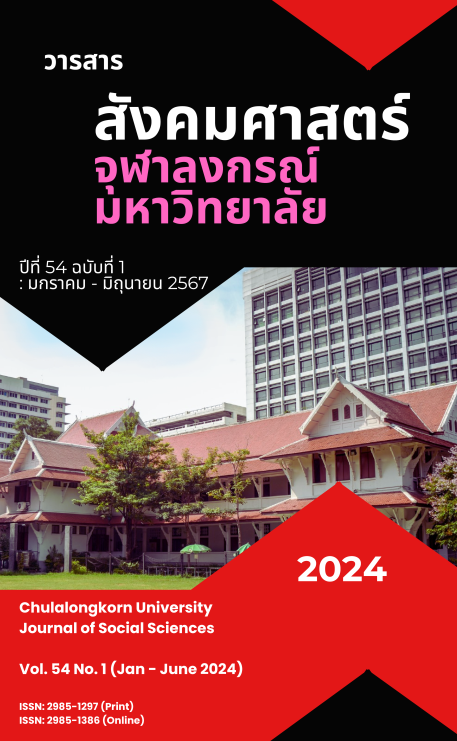ระบอบอำนาจนิยมที่มีการเลือกตั้ง: กรอบแนวคิด, การเลือกตั้งในระบอบอำนาจนิยม และการควบคุมบงการ
DOI:
https://doi.org/10.61462/cujss.v54i1.2520คำสำคัญ:
การทำให้เป็นประชาธิปไตย, ระบอบผสม, อำนาจนิยมที่มีการเลือกตั้ง, การเลือกตั้ง, การควบคุมบงการบทคัดย่อ
บทความนี้เป็นการสำรวจแนวความคิดที่อธิบายปรากฎการณ์ระบอบการเมืองโลกหลัง “คลื่นลูกที่สามของประชาธิปไตย” ซึ่งพบว่าประเทศจำนวนมากไม่ได้เป็นไปตามกระบวนทัศน์การเปลี่ยนผ่านไปสู่ประชาธิปไตย แต่ตกอยู่ภายใต้ระบอบการเมืองที่เรียกว่า “อำนาจนิยมที่มีการเลือกตั้ง (Electoral Authoritarianism)” ที่เป็นการปกครองแบบอำนาจนิยมแต่ยังคงมีการเลือกตั้งแบบหลายพรรคและสถาบันการเมืองแบบประชาธิปไตยไว้ นอกจากนั้นยังพยายามอภิปรายถึงบทบาทของการเลือกตั้ง ที่โดยทั่วไปแล้วจะเป็นเครื่องมือในระบอบประชาธิปไตยหรือเป็นกลไกสำคัญในการทำให้เป็นประชาธิปไตย ได้กลายเป็นส่วนหนึ่งของการปกครองแบบอำนาจนิยม เพื่อสร้างความชอบธรรมและการยอมรับจากประชาคมทั้งในและนอกประเทศ และสุดท้าย สำรวจวิธีการควบคุมบงการการเลือกตั้งและสถาบันการเมืองเพื่อรักษาอำนาจของผู้ครองครองแบบอำนาจนิยมไว้ต่อไป
Downloads
เอกสารอ้างอิง
Attasit Pankaew. 2021. “Phakkanmueang Lae Kan Luektung.” [Political Parties and Elections.] In Kanmueang Amnat Khwamru: Lak Ratthasat Bueangton Samnak Thammasat. [The Politics, Power, Knowledge: Basic Principles of Political Science, Thammasat University], edited by Prajak Kongkirati, 273-306, Bangkok: Siamparitut. (in Thai)
Britannica. 2021. “Functions of elections.” Accessed October 14, 2023. https://www.britannica.com/topic/election-political-science/Functions-of-elections
Carothers, Thomas. 2002. “The End of the Transition Paradigm.” Journal of Democracy 13 (1): 5-21. https://doi.org/10.1353/jod.2002.0003
Case, William. 2006. “Manipulative Skills: How Do Rulers Control the Electoral Arena?” In Electoral Authoritarianism: The Dynamics of Unfree Competition, edited by Andreas Schedler, 93–112. Boulder, Colorado: Lynne Rienner Publishers. https://doi.org/10.1515/9781685857479-008.
Collier, David, and Steven Levitsky. 1997. “Democracy with Adjectives: Conceptual Innovation in Comparative Research.” World Politics 49 (3): 430–51. https://doi.org/10.1353/wp.1997.0009.
Diamond, Larry. 2002. “Elections Without Democracy: Thinking About Hybrid Regimes.” Journal of Democracy 13 (2): 21–35. https://doi.org/10.1353/jod.2002.0025.
Gandhi, Jennifer, and Ellen Lust-Okar. 2009. “Elections Under Authoritarianism.” Annual Review of Political Science 12 (1): 403–22. https://doi.org/10.1146/annurev.polisci.11.060106.095434.
Huntington, Samuel P. 1991. The Third Wave: Democratization in the Late Twentieth Century. The Julian J. Rothbaum Distinguished Lecture Series, Vol. 4. Norman, Oklahoma: University of Oklahoma Press.
Levitsky, Steven, and Lucan A. Way. 2002. “Elections Without Democracy: The Rise of Competitive Authoritarianism.” Journal of Democracy 13 (2): 51–65. https://doi.org/10.1353/jod.2002.0026.
Levitsky, Steven, and Lucan A. Way. 2010. Competitive Authoritarianism: Hybrid Regimes after the Cold War. Reissue edition. Cambridge: Cambridge University Press.
Morgenbesser, Lee. 2014. “Elections in Hybrid Regimes: Conceptual Stretching Revived.” Political Studies 62 (1): 21–36. https://doi.org/10.1111/1467-9248.12020.
Prajak Kongkirati and Veerayooth Kanchoochat. 2018. “The Prayuth Regime: Embedded Military and Hierarchical Capitalism in Thailand.” TRaNS: Trans-Regional and -National Studies of Southeast Asia 6 (2): 279–305. https://doi.org/10.1017/trn.2018.4.
Prajak Kongkirati. 2021. “Rabop Prachathippatai Lae Rabop Thi Mai Chai Prachathippatai : Kansueksa Rabop Kanmueang Choeng Priapthiap. [Democracy and Non-Democracy: A Comparative Study of Political Regimes.”] In Kanmueang Amnat Khwamru: Lak Ratthasat Bueangton Samnak Thammasat. [The Politics, Power, Knowledge: Basic Principles of Political Science, Thammasat University]. edited by Prajak Kongkirati, 145-84, Bangkok: Siamparitut. (in Thai)
Schedler, Andreas. 2002. “Elections Without Democracy: The Menu of Manipulation.” Journal of Democracy 13 (2): 36–50. https://doi.org/10.1353/jod.2002.0031
Schedler, Andreas. 2006. “The Logic of Electoral Authoritarianism.” In Electoral Authoritarianism: The Dynamics of Unfree Competition, edited by Schedler, Andreas, 1-23. Boulder, Colorado: Lynne Rienner Publishers. https://doi.org/10.1515/9781685857479-003
Schedler, Andreas. 2013a. The Politics of Uncertainty: Sustaining and Subverting Electoral Authoritarianism. New York: Oxford University Press. https://doi.org/10.1093/acprof:oso/9780199680320.001.0001.
Schedler, Andreas. 2013b. “Emerging Trends in the Study of Electoral Authoritarianism.” http://repositorio-digital.cide.edu//handle/11651/1412.
Yoshifumi, Tamada. 2008. “Prachathippatai, Kan Thamhai Pen Prachathippatai, Lae Kan Ok Chak Prachathippatai Khong Prathet Thai.” [Democracy, Democratization and De-Democratization in Thailand] Samesky 6 (4): 98-139. (in Thai).
ดาวน์โหลด
เผยแพร่แล้ว
รูปแบบการอ้างอิง
ฉบับ
ประเภทบทความ
สัญญาอนุญาต
ลิขสิทธิ์ (c) 2024 คณะรัฐศาสตร์ จุฬาลงกรณ์มหาวิทยาลัย

อนุญาตภายใต้เงื่อนไข Creative Commons Attribution-NonCommercial-NoDerivatives 4.0 International License.
เงื่อนไขการอนุญาตสาธารณะ
นโยบายลิขสิทธิ์และการอนุญาต
วารสารสังคมศาสตร์ จุฬาลงกรณ์มหาวิทยาลัย เผยแพร่เนื้อหาทั้งหมดภายใต้ สัญญาอนุญาตครีเอทีฟคอมมอนส์แบบแสดงที่มา-ไม่ใช้เพื่อการค้า-ไม่ดัดแปลง 4.0 นานาชาติ (CC BY-NC-ND 4.0)
ลิขสิทธิ์
บทความทั้งหมดที่ตีพิมพ์ในวารสารสังคมศาสตร์ จุฬาลงกรณ์มหาวิทยาลัย เป็นลิขสิทธิ์ของ คณะรัฐศาสตร์ จุฬาลงกรณ์มหาวิทยาลัย ผู้เขียนจะโอนสิทธิ์ทั้งหมดให้แก่วารสารเมื่อบทความได้รับการตอบรับให้ตีพิมพ์
สัญญาอนุญาต CC BY-NC-ND 4.0
ภายใต้สัญญาอนุญาตนี้:
-
แสดงที่มา (BY): ผู้ใช้ต้องแสดงที่มาโดยอ้างอิงถึงผู้เขียน คณะรัฐศาสตร์ จุฬาลงกรณ์มหาวิทยาลัย และวารสารสังคมศาสตร์ จุฬาลงกรณ์มหาวิทยาลัย พร้อมทั้งให้ลิงก์ไปยังสัญญาอนุญาต และระบุหากมีการเปลี่ยนแปลง ทั้งนี้สามารถทำได้ในลักษณะที่สมเหตุสมผล แต่ต้องไม่ทำในลักษณะที่แสดงว่าผู้อนุญาตให้การรับรองผู้ใช้หรือการใช้งานดังกล่าว
-
ไม่ใช้เพื่อการค้า (NC): ผู้ใช้ไม่สามารถใช้เนื้อหาเพื่อวัตถุประสงค์ทางการค้า การใช้งานเชิงพาณิชย์จะต้องได้รับอนุญาตเป็นลายลักษณ์อักษรล่วงหน้าจากผู้เขียนและคณะรัฐศาสตร์ จุฬาลงกรณ์มหาวิทยาลัย
-
ไม่ดัดแปลง (ND): หากผู้ใช้นำเนื้อหาไปรวม ดัดแปลง หรือต่อยอด ผู้ใช้ไม่สามารถเผยแพร่งานที่ดัดแปลงนั้นได้ การดัดแปลงผลงานจะต้องได้รับอนุญาตเป็นลายลักษณ์อักษรล่วงหน้าจากผู้เขียนและคณะรัฐศาสตร์ จุฬาลงกรณ์มหาวิทยาลัย
นโยบายการเข้าถึงแบบเปิด
วารสารสังคมศาสตร์ จุฬาลงกรณ์มหาวิทยาลัย ให้การเข้าถึงเนื้อหาแบบเปิดโดยทันทีตามหลักการที่ว่าการทำให้งานวิจัยสามารถเข้าถึงได้อย่างเสรีแก่สาธารณะจะสนับสนุนการแลกเปลี่ยนความรู้ในระดับโลก ผู้ใช้สามารถอ่าน ดาวน์โหลด คัดลอก เผยแพร่ พิมพ์ ค้นหา หรือเชื่อมโยงไปยังเนื้อหาฉบับเต็มของบทความได้โดยไม่ต้องขออนุญาตล่วงหน้าจากผู้จัดพิมพ์หรือผู้เขียน ทั้งนี้เป็นไปตามสัญญาอนุญาต CC BY-NC-ND 4.0
นโยบายการเก็บบันทึกด้วยตนเอง
ผู้เขียนสามารถเก็บบันทึกบทความฉบับตีพิมพ์สุดท้าย ต้นฉบับที่ส่ง (preprint) หรือฉบับที่ผ่านการประเมิน (postprint) ในคลังสถาบันหรือเว็บไซต์ส่วนตัวได้ โดยต้องมีการอ้างอิงการตีพิมพ์ครั้งแรกในวารสารสังคมศาสตร์ จุฬาลงกรณ์มหาวิทยาลัย พร้อมระบุแหล่งอ้างอิงที่สมบูรณ์และลิงก์ไปยังเว็บไซต์ของวารสาร
การขออนุญาต
สำหรับการใช้งานนอกเหนือจากที่ครอบคลุมโดยสัญญาอนุญาต CC BY-NC-ND 4.0 กรุณาติดต่อ:
กองบรรณาธิการ
วารสารสังคมศาสตร์ จุฬาลงกรณ์มหาวิทยาลัย
คณะรัฐศาสตร์ จุฬาลงกรณ์มหาวิทยาลัย
Email: cusocscij@gmail.com
สำหรับข้อมูลเพิ่มเติมเกี่ยวกับสัญญาอนุญาตครีเอทีฟคอมมอนส์แบบแสดงที่มา-ไม่ใช้เพื่อการค้า-ไม่ดัดแปลง 4.0 นานาชาติ กรุณาเยี่ยมชม: https://creativecommons.org/licenses/by-nc-nd/4.0/deed.th





